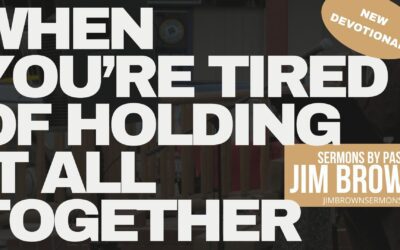MARCH 23, 2025
EP 17: WE NEED A KING | FINDING TRUE SECURITY IN GOD
1 & 2 Samuel
Driving through fog feels unsettling, doesn’t it? Life can feel the same way—uncertain, confusing, and out of control. But true security in God comes when we stop trying to figure it all out ourselves and start trusting Him completely. If you’ve been feeling restless or unsure, this message will help you see how seeking God brings peace and strength even when life feels uncertain.
Sermon Study Resources
Sermon Notes
Your Subtitle Goes Here
Sermon Notes
We Need A King | Finding True Security in God
Main Scripture: 1 & 2 Samuel
Introduction
- It’s been foggy out. How do you feel driving in the fog, especially at night?
- Have you ever had your house broken into or something stolen? How did that make you feel?
- Stress and tension in relationships — with spouses, kids, parents — often stem from one thing: a lack of security in God.
- The common denominator behind all these challenges is a deep human need for security.
1. The Human Need for Security
- Mankind has a deep need for security that we try to fill with relationships, money, careers, and even people — but it always leaves a void.
- As Christians, we need to ask ourselves:
- Are we really growing closer to God?
- Are we placing our hope in Him or still trying to fill the void ourselves?
- Hebrews 13:8 (NIV) — “Jesus Christ is the same yesterday and today and forever.”
- This verse reminds us that true security is found in the unchanging nature of God.
- When we feel insecure, remembering that God is unchanging should bring us peace.
2. Faith Has Always Been the Foundation
- From Genesis to today, faith has always been the key to walking with God.
- Hebrews 11:1 (NLT) — “Faith shows the reality of what we hope for; it is the evidence of things we cannot see.”
- Faith isn’t just believing in God — it’s relying on Him.
- Adam and Eve’s downfall came when they stopped trusting God and tried to handle things on their own.
- Hebrews 11:6 (NIV) — “Without faith, it is impossible to please God…”
- God expects us to live by faith, not by sight.
- Faith means trusting God even when you can’t see the outcome.
3. Israel’s Misplaced Desire for a King
- The Israelites asked for a king because they thought a human ruler would bring them security.
- Despite seeing God’s miracles and deliverance, they wanted a human king instead of relying on God.
- 1 Samuel 3:10 (NIV) — Samuel’s response to God was, “Speak, for your servant is listening.”
- Samuel’s strength came from his willingness to listen to God and trust Him.
- The Israelites were looking for security in a king instead of seeking God’s protection.
4. Saul’s Failure and David’s Response
- Saul’s downfall came from disobedience and pride:
- He offered a sacrifice without waiting for Samuel.
- He failed to carry out God’s command to destroy the Amalekites.
- Saul acted like he was above God’s authority.
- David also sinned (with Bathsheba), but the difference was David’s repentance.
- Psalm 51:10 (NLT) — “Create in me a clean heart, O God. Renew a loyal spirit within me.”
- David sought forgiveness and restoration instead of justifying his sin.
5. True Security Comes From Trusting God
- Saul sought security through power and control — but it failed.
- David found security by seeking God and trusting Him completely.
- Psalm 4:8 (NLT) — “In peace I will lie down and sleep, for you alone, O Lord, will keep me safe.”
- David was able to rest because his trust was in God, not in his circumstances.
- True security isn’t found in people, power, or position — it’s found in trusting God.
6. The Power of Repentance and Forgiveness
- God’s forgiveness is always available — but it requires true repentance.
- Psalm 51:17 (NLT) — “The sacrifice you desire is a broken spirit. You will not reject a broken and repentant heart, O God.”
- God doesn’t want religious effort or performance — He wants a humble heart.
- 1 Peter 4:17 (NIV) — “For it is time for judgment to begin with God’s household…”
- God calls us to accountability.
- We can’t fake it with God — He sees the heart.
7. Listening to God and Trusting His Plan
- God speaks to those who are willing to listen.
- Psalm 66:18 (NIV) — “If I had cherished sin in my heart, the Lord would not have listened.”
- Unconfessed sin blocks our connection with God.
- Confessing sin opens the door for healing and clarity.
- James 5:13-16 (NIV) — “Therefore confess your sins to each other and pray for each other so that you may be healed.”
- God’s healing comes through prayer and confession.
- Seeking God leads to restored peace and security.
8. Surrendering the Throne
- We already have a King — Jesus Christ.
- Matthew 11:28 (NIV) — “Come to me, all you who are weary and burdened, and I will give you rest.”
- True rest and peace come from surrendering control to Jesus.
- Galatians 6:7 (NIV) — “Do not be deceived: God cannot be mocked. A man reaps what he sows.”
- Living by faith means trusting God’s plan — not trying to control the outcome.
- To find true security, we must stop sitting on the throne of our lives and let God lead.
9. How Do You Know If You’re Living by Faith?
- Are you listening to God or trying to figure things out on your own?
- Psalm 139:23-24 (NLT) — “Search me, O God, and know my heart…”
- Ask God to reveal areas where you aren’t trusting Him.
- A life of faith starts with surrendering control.
10. A Call to Trust God Completely
- Security comes not from success or comfort, but from knowing God.
- A life of faith means:
- Seeking God’s guidance.
- Trusting Him with the outcome.
- Confessing sin and relying on God’s grace.
- “We have a King — but the catch is, you’ve got to get off the throne and let Him lead.”
- True security comes when we allow God to rule in every area of our lives.
Reflection Questions:
- Are you seeking security in things or in God?
- Are you living by faith or by fear?
- Is there an area of sin or disobedience you need to confess to God?
- Are you willing to let go of control and trust God with the outcome?
Key Takeaway:
True and lasting security in God comes from surrendering control and trusting Him completely. When we seek Him and live by faith, we’ll experience peace, strength, and true security that the world cannot give.
Additional Scriptures for Study:
- 1 Samuel 3:10 — Listening to God
- Psalm 51 — A Prayer of Repentance
- James 5:13-16 — The Power of Confession and Prayer
- Hebrews 11 — Living by Faith
- Galatians 6:7 — Reaping What You Sow
Bible Verses
Your Subtitle Goes Here
Bible Verses
Hebrews 13:8 (NIV)
“Jesus Christ is the same yesterday and today and forever.”
Genesis 1:1 (NIV)
“In the beginning God created the heavens and the earth.”
Hebrews 11:1 (NLT)
“Faith shows the reality of what we hope for; it is the evidence of things we cannot see.”
Hebrews 11:6 (NIV)
“And without faith, it is impossible to please God, because anyone who comes to him must believe that he exists and that he rewards those who earnestly seek him.”
1 Samuel 3:10 (NIV)
“The Lord came and stood there, calling as at the other times, ‘Samuel! Samuel!’ Then Samuel said, ‘Speak, for your servant is listening.'”
Psalm 4:8 (NLT)
“In peace I will lie down and sleep, for you alone, O Lord, will keep me safe.”
Deuteronomy 17:18-19 (NIV)
“When he takes the throne of his kingdom, he is to write for himself on a scroll a copy of this law, taken from that of the Levitical priests. It is to be with him, and he is to read it all the days of his life so that he may learn to revere the Lord his God and follow carefully all the words of this law and these decrees.”
Psalm 51:1-2 (NLT)
“Have mercy on me, O God, because of your unfailing love. Because of your great compassion, blot out the stain of my sins. Wash me clean from my guilt. Purify me from my sin.”
Psalm 51:10 (NLT)
“Create in me a clean heart, O God. Renew a loyal spirit within me.”
Psalm 51:17 (NLT)
“The sacrifice you desire is a broken spirit. You will not reject a broken and repentant heart, O God.”
1 Peter 4:17 (NIV)
“For it is time for judgment to begin with God’s household; and if it begins with us, what will the outcome be for those who do not obey the gospel of God?”
Psalm 66:18 (NIV)
“If I had cherished sin in my heart, the Lord would not have listened.”
Psalm 139:23-24 (NLT)
“Search me, O God, and know my heart; test me and know my anxious thoughts. Point out anything in me that offends you, and lead me along the path of everlasting life.”
Matthew 11:28 (NIV)
“Come to me, all you who are weary and burdened, and I will give you rest.”
Psalm 32:3-4 (NLT)
“When I refused to confess my sin, my body wasted away, and I groaned all day long. Day and night your hand of discipline was heavy on me. My strength evaporated like water in the summer heat.”
Galatians 6:7 (NIV)
“Do not be deceived: God cannot be mocked. A man reaps what he sows.”
James 5:13-16 (NIV)
“Is anyone among you in trouble? Let them pray. Is anyone happy? Let them sing songs of praise. Is anyone among you sick? Let them call the elders of the church to pray over them and anoint them with oil in the name of the Lord. And the prayer offered in faith will make the sick person well; the Lord will raise them up. If they have sinned, they will be forgiven. Therefore confess your sins to each other and pray for each other so that you may be healed. The prayer of a righteous person is powerful and effective.”
Sermon Slides
Your Subtitle Goes Here
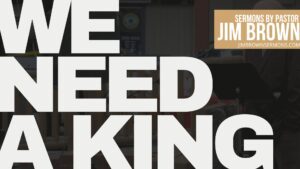


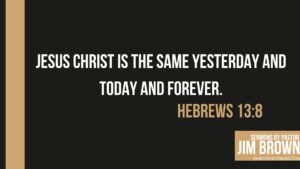
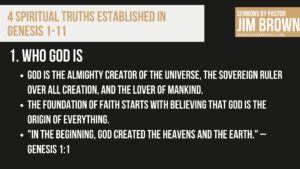
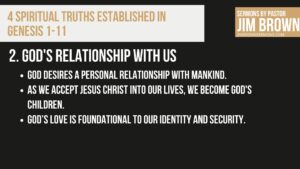
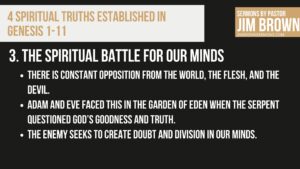
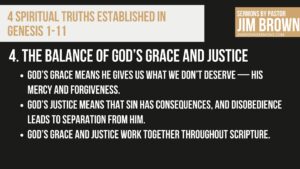
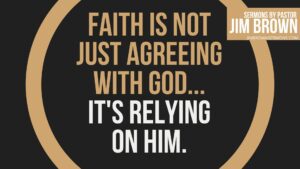
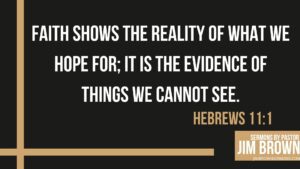
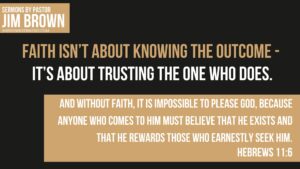
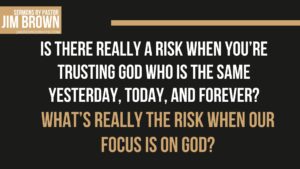
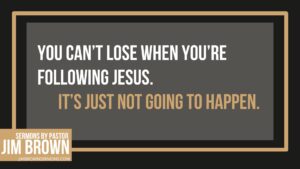
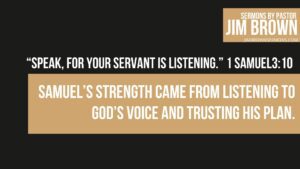
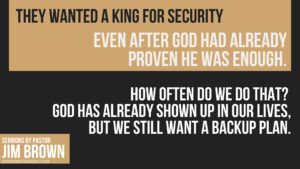

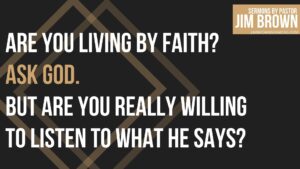
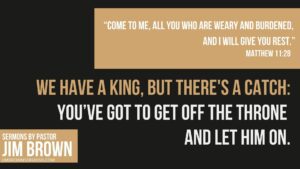

Related Song List
Your Subtitle Goes Here
Recommended Resources
Your Subtitle Goes Here
Recommended Books
“Trusting God: Even When Life Hurts” by Jerry Bridges
This book explores the sovereignty of God and encourages believers to trust Him, even in difficult circumstances.
“Ruthless Trust: The Ragamuffin’s Path to God” by Brennan Manning
Manning delves into the necessity of trust in one’s relationship with God, highlighting that true security is found in Him.
“The Reason for God: Belief in an Age of Skepticism” by Timothy Keller
Keller addresses common doubts about Christianity and presents a case for trusting in God amidst skepticism.
“Mere Christianity” by C.S. Lewis
Lewis discusses the essence of Christian faith and the importance of trusting God.
“The Gift of Forgiveness” by Charles Stanley
Stanley explores the power of forgiveness and how it leads to spiritual freedom.
Some of these above links in this post maybe affiliate links, and we may earn a small commission at no additional cost to you. These are resources that we would recommend regardless of whether we earn a commission or not. The income generated helps cover website maintenance costs, allowing us to continue sharing sermons, resources, and content with you. We appreciate your support!
Sermon Transcript
Your Subtitle Goes Here
Transcript: We Need A King | Finding True Security in God
So it’s been foggy out. How do you feel about it? How do you like driving in the fog? Especially at night, you got a long ways to go and you’re driving along mile after mile and a deep, deep fog. You don’t know if your headlights do you any good or they’re better off. Off. You put on the brights and you see more fog. How about have you’ve ever been broken into having your house broke into and you come home and you know something’s wrong, just this eerie feeling or maybe your car something stolen again. How do you feel about that? What goes on? Maybe you were the last one hired in a position and the economy changes goes through its swings and you know the saying last one, hired first one.
Now there’s a lot of things, the relational stress tensions within our relationships at home with our spouses, with our kids, with our moms, with our dads, with all just at work. There’s anger, abandonment, neglect over controlling going on in our lives. What do all these things have as a common denominator? They seem very different in their situations, but one thing that they all have in common is security. A sense of being out of control, a sense of a need for security. It’s a well established fact that mankind has a deep need for security and it’s met in a lot of different ways. We go about life trying to meet that need in a lot of ways, and we’ve all, to some degree felt the void like it’s just not being met. It’s just there. And no matter what we do, we can’t seem to fill that void.
The real question is for us as Christians, as time goes on, are we really getting closer to God? Are we really sensing his presence more and more in our life? And are we placing our hope in him or continuing on that treadmill of trying to somehow fill the void ourselves? Are we growing in that sense of security but only in the sense that God is the one that meets it? If you remember the verse that we’re using to cover this series through the Old Testament, it comes from Hebrews 13, Hebrews 13, eight, Jesus Christ is the same yesterday, today, and forever. Does that bring you security? Do you remember that When you need to, when you’re feeling insecure, what difference does it make that Jesus is the same? See, the unchanging nature of Almighty God, the theme that we’re using to kind of walk through the Old Testament, well, we’re not exactly walking, we’re kind of running through the Old Testament here, but the reason we’re running through it and covering it so quickly is I don’t want to lose the theme.
I don’t want to get bogged down into details right now, just this overall theme that Jesus Christ, it’s the same yesterday, today and forever. And so we’re going through this fairly quickly, but we want to see God in his entirety through the Old Testament and that he is sufficient for each one of us. The result should be that as believers in Jesus Christ, that we are secure and with that security are able to bring it to a lost and dying world. Who desperately needs Jesus. Question is, are you made in God’s image? It’s pretty much where we started. Are you made in God’s image? Not would you like to be or what do you need to do to kind of become it? But scripture says that we are made in the image and likeness of God. And since the very beginning of Genesis, trusting God and believing that has been key to us going on with a walk with God, that he provides all our needs, that he is the great provider, and that’s where most generations throughout the Old Testament have fallen apart and we fall apart today.
It’s truly believing it and applying it to our lives today. So I’m going to do sort of a big review here first. That’s where we’re going to start with some of the ground that we’ve covered. Who wrote the first five books of the Bible? Can we remember Moses? Why did he write ’em? Because they were in a culture that was surrounded by false gods. And so where did he start? In the beginning? God, he didn’t try to prove him in a science class or anything else, but told them that God was the beginner of all things. Fact, just start with that. Believe it by faith. That’s what he was saying. We start with faith believing that almighty creator God started it all because there were a lot of false beliefs in that time of how the world ever got started. And then he brought them from that point, Moses brought them from that point all the way to being a nation, a whole nation of people with instructions on how to operate as a nation.
So if you’ll remember, there were four spiritual truths that were established in Genesis one through 11, and they can’t be neglected. As we study God’s word and go further into the Bible, we’ve got to understand who God is, who the true God is as a mighty creator of their universe and the lover of mankind and our relationship with him, God’s relationship with us, that as we accept Jesus Christ into our life, we become his children. But he is got this relationship of love that he desires to have with each person on an individual basis. And then the introduction of a spiritual battle for our mind that there is a whole raft of opposition from the world, the flesh and the devil against those first two truths. Adam and Eve faced it surely God, this surely God that he can’t do this, he can’t do that.
He doesn’t love you or this or that. There’s a battle going on for our mind that tries to discredit the work of God in each one of our lives and we need to understand that. And we saw it demonstrated throughout the Book of Genesis, particularly the foundation was laid in chapters one through 11, and then the balance of God’s grace, his great grace, not giving us what we deserve, but giving us what we could never deserve. But then also his justice for those who don’t accept his ways. And then what man’s responsibility is those are all laid out in Genesis and they carry right on through the Bible. And as you read the Bible, you need to keep those things in mind. So now remember, the primary setting was of pagan worship. That’s what Moses was working with, people who were worshiping false gods. They were driven by idols.
There was a lot of opposition to what Moses was teaching them. So Genesis gives us the perspective that’s necessary to understand the rest of scripture. We understand the universe functions under laws, right? The law of gravity is our most obvious. You can’t break it and get away with it, but there are laws that overcome it such as aerodynamics. But should the law of aerodynamics cease to exist, the law of gravity takes over again, and that’s how we see Jesus Christ. He became a greater law for us, but should we cease to exist in the law of Christ and follow him, the law of gravity or the old law will take over. And so we want to stay under the law of Christ. It’s very important to understand that there are laws, spiritual laws as well as physical laws that we can’t compromise the laws of nature without suffering consequences, nor can we break the spiritual laws of God and not suffer consequences either.
So spiritual laws don’t have their basis and behavior. What they are is they’re spiritual and they direct our behavior. They’re of faith, they’re of believing God for what he says. Active faith is known as trust. So faith is key to spiritual awakening and spiritual law. Do you believe that God has your best interest? Another good question we need to answer is God good. Believe it by faith Sometimes there’s questions about that whether he is really good. So faith means relating to God the way he’s called us to relate to him, and therefore we trust him in every area of our life. Adam and Eve related to God on the basis of faith. Why? Because he said, don’t eat from that particular tree because you’ll die. They didn’t know what death was and so they needed to live by faith when they no longer lived by faith.
Well, the spiritual laws took over and they suffered the consequences. So faith is not just giving mental ascent, it’s not just saying, oh yeah, I agree with this, or I agree with that, or I agree with God. He’s right, but it’s actually demonstrating reliance on God. I’m going to go through Hebrews 11, one through 40 real quick. Okay, we’re going to hit some highlights there, but really this is the definition of faith from the Old Testament. A lot of people say, well, the Old Testament was full of law. People came to God on the basis of law. That’s not true. People came to God on the basis of faith by grace back then, just like they do now in Hebrews 11, it says, what is faith? It is the confident assurance. Well, what’s confident assurance? Do you have confident assurance in anything? Your car when you get up in the morning that it’s going to start and get you to work?
Do you have confident assurance that the sun’s going to rise? Well, not lately. What is confident assurance? Think about it now. It’s confident assurance that we hope for is what’s going to happen. What do we hope for? Well, what God says is going to happen that he will return and will be taken with him and that we are his children saved forever. That’s our hope. That’s where we place our hope. It’s the evidence of things that we can’t see. You can’t see God, but you know he’s there. The common question is, well, do you believe you have a brain? Have you ever seen it? How do you know it’s there?
Right? Well, by faith, I guess by faith we understand the entire universe was formed just like it said in Genesis at God’s command in verse four, it says, Abel brought a more acceptable sacrifice to God by faith. Enoch was taken up to heaven without dying. He lived by faith in verse six. So you see, it is impossible to please God without faith. Anyone who wants to come to him must believe that there is a God and that he rewards those who sincerely seek him. And that’s an important point. When I was still practicing new age methods and seeking God in that way, somebody challenged me, you really interested in finding the true God? And I said, I really am. And I was on a journey to do that. He says, as long as you continue to seek God, you’ll end up a Christian. I. Well, I don’t want to be a Christian, but I do want to know God.
And so it wasn’t probably three months after that I continued letting God know whoever he was, that I wanted to know him. And then God arranged the circumstances for a wonderful meeting. So it’s for those who sincerely seek him. That’s what he’s interested in. It was by faith that Noah built an arc. It was by faith that Abraham obeyed God and left his family. It was by faith, Sarah and Abraham who weren’t able to have a child who had a child. It was by faith that Abraham offered that child, Isaac as a sacrifice when God asked him to see, these are all things that we’ve been going through. Faith, faith, faith. Verse 20. It was by faith that Isaac blessed his two sons, Jacob and Esau. He had confidence that what God said earlier was going to continue to happen in and through their lives.
It was by faith that Jacob, when he was old, blessed that Joseph’s sons saying that it’s going to continue to carry on. God’s promises are true. They’ll continue to carry on even though he couldn’t see the nation. And he said that he believed that there was going to be a nation. Bring my bones with you out of Egypt. Verse 23. Moses’ parents hid him by faith. It was by faith that when he grew up, he refused to be treated as the Pharaoh’s son. 27, Moses left the land of Egypt by faith, trusting God to give him direction, keeping his eyes on the one who is invisible, keeping his eyes on the one who’s invisible. Imagine that in 29, the people of Israel went right through the Red Sea. By faith, the people of Israel marched around Jericho by faith. It was by faith that Rahab didn’t die with the rest of the people in her city because she believed in the real God, the Almighty God, the deliverer God.
Verse 32, the writer goes on to say, how much more do I need to say? It would take too long to recount all the stories of faith about Gideon, Barrick, Sampson, JHA, David Samuel, all the prophets. All these people didn’t live by the law. They lived by faith. By faith. They overthrew kingdoms ruled with justice and received what God had promised them. So what’s the Old Testament about? Faith? Faith, faith, faith. What’s the New Testament about faith? Faith. Faith. We can trust God. See from the human viewpoint, faith involves risk or at least the perceived risk. And that faith has got to be founded on God’s word and then that perceived risk begins to diminish. It’s just a figment of our imagination at best. Is there really a risk when you’re trusting God who is the same yesterday, today and forever, and that he treated people the same yesterday, he treats ’em the same and will he treat them the same forever?
You see what’s really the risk when our focus is on God trusting in Jesus and the concept of any kind of loss isn’t an option. You can’t lose when you’re following Jesus. It’s just not going to happen. True security is only going to be found in understanding God’s character. True security can only be found as we seek God and understand his character. We only grow in security as we trust him every day more and more in our lives with every aspect of our life. That’s where security comes from. So you might say, well, how can I tell? Can I tell what? Well, how can I tell whether or not you’re living by faith? I can’t. It’s not my job. It’s not my job to know whether you live by faith or not, but how can I tell if I’m living by faith? That’s the question.
How can I know if I’m living by faith? There’s the same question you need to ask yourselves. That’s what we’re going to look at today, the books of Samuel first and second Samuel, and we’re going to see a little bit about how we answer that question. How do you know if you’re living by faith? I’m going to do a quick review of Joshua and Judges. So set the scene for where we were last week in case you weren’t here in the book of Joshua, Israel experienced great victories and closeness to God based on the result of acting on faith. They acted on faith, they experienced victory. It’s sort of like one of those rags to riches story that everybody loves, right? Mostly the richest part. That’s what it was like. They were wandering in the wilderness for 40 years and suddenly they’re getting great victories and God is blessing them as a result of their faith.
Well then comes judges. Everybody likes rags to riches. Well, it’s rags to riches to rags. Again, that’s what we see in judges. They have these disjointed tribes. Now they’re a nation, but they’re not working together. They’re not clearing the land as they were told to of the enemies of the Lord. They’re allowing false idols to take over and the judges are not staying close to God. The people who are supposed to be leading God’s people, and they’d get into great bondage and then the judge would be raised up and the people would repent, and then they’d commit themselves to God for a little while and then they’d fall back again. And it was back and forth, back and forth, and over a period of 300 years, it just all went downhill continually. The judges got farther and farther away from God and so did the people.
They allowed primarily the pagan beliefs to occupy the land. When God said, you need to get rid of them, they were entertaining the culture around them more than they were focusing on God. The people of Israel were feeling vulnerable. Does that explain or describe insecurity to you at all? Feeling vulnerable. So the books of Samuel are moving the people to monarchy now that is to kingship. No one ever invented a system of security, and the kingship was never meant to bring them security. There is no security apart from God. God is making that clear. He never intended for kings to bring security because only he could do that. First Samuel begins with the rule of the last two judges, which is Eli and Samuel, and then the reign of the first two kings, which is Saul and David in the early chapters were given an account of Samuel’s birth and his upbringing in the tabernacle.
He was raised under Eli during the dark days of Eli and his wicked sons who were not walking after the Lord. The strength of Samuel’s ministry can be boiled down to his very first response to God. In one Samuel three 10, it says, the Lord came and stood and called as the other times Samuel, Samuel and Samuel said, speak for your servant is listening. That was the key to Samuel’s ministry, allowing God to speak into his life and listening. Now, when we talk about listening, that just doesn’t mean hearing. It’s not like when you say to your kids, did you hear me or are they listening? There’s a difference, isn’t it? Yeah, I heard you. I’m just not listening. I’m not following through on what you’re saying. I’m not letting it affect my life. No, he wanted to listen to God.
So then shortly after that, under Eli the Philistines, take the Ark of the Covenant, capture it, take it away, and it’s a sad time. One of Eli’s grandsons was born at this particular time, and his name that’s given to him is an indication of the conditions of Israel. You might have heard that Iabd, it means the glory of God has left. The loss of the covenant of the Ark indicated very graphically to the people that God had abandoned his people, that they had abandoned him, that there was separation. But under the leadership of Samuel, Israel is able to break free from the Philistines then and enjoy a measure of peace that people confess their sins important note to self that people confess their sins and Samuel then for them then a new name is given to the nation and a monument is built and that name is Ebenezer.
Ebenezer for God is our help in time of trouble. See, they turned back to God and God visited him, but to Samuel’s distress, what happens then is they ask for a king. They wanted to be just like all the other nations. They wanted a king. Why? Because they believed the king would bring them security. The thing is, they had just seen God defeat their enemies with hailstones and they’re saying, okay, let’s have a king so he can bring a security when a king could never do that. It’s a funny thing how we turn from God even when we see him working greatly, but we see God work in the past. We’ll see him work today, but we don’t trust him to work for tomorrow, yesterday, today and forever. That’s where the faith comes in, not faith for yesterday, not faith so much for today, as much as faith for tomorrow that we don’t try to control and manipulate tomorrow and have it work out our way and try to gather a sense of security.
The idea of a king isn’t new to Israel because Jacob predicted that there would be the raising up of a king. And in Deuteronomy chapter 17, it tells all the instructions for how a king should operate in the land. But the people wanted a king for security, for visible security. And that’s what the problem is. Samuel warns them that their failure to trust God for their security is going to result in higher taxes. They got to support this bureaucracy. They’re going to be drafted into the military. It’s not going to be a pretty sight, but they wanted them anyway. It’s a high price to pay for a lack of faith, especially when they had just seen God work miraculously in their life. So they got Saul is king and Saul is privately anointed by Samuel, and then he’s publicly proclaimed and just as the judges were before this, there’s great victory under Saul against the enemies.
And so he’s accepted by the people and he seemed on the outward to be a good king. Outwardly he was successful. He defeated the enemies. He freed them from oppression. He worships the true God. He doesn’t worship idols. He rids and expels all the mediums and spiritists from the land. But our interest isn’t so much in how God was using him in these victories, but why it is that he and his family line were removed from the kingship. See, it wasn’t just the outward that matters to God. In one Samuel 13 through 15, it shows two particular failures of King Saul. The first one was that he wasn’t following instructions. Don’t you hate that? He wasn’t following instructions. Samuel said, wait for me before you offer a sacrifice before the battle. Well, he couldn’t wait, so he went ahead and offered to sacrifice without Samuel.
Sounds like he did the right thing. He still offered to sacrifice, but he didn’t pay close attention to the instructions, to the details of following God’s word. He did it in a general sense, but not in a specific sense. Just good enough is what he was looking for when it came to God. And then not carrying out total destruction against the maites as God commanded because they were such a wicked people. God knew that if they allowed the malachite to continue to exist, that they would pollute the people of God. So both of these failures show that Saul has a misunderstanding of what it means to be a king. You see, back in those days, Kings had total rule. They were God. Saul is believing that he is like God. He believes that what he says is law and that’s good enough. He believes that he’s an absolute monarch, that his rule is everything.
Israel is already given the law by God, isn’t he? Aren’t they? And in giving that law, they now have something to follow other than a king. So God speaks through the prophets as he spoke through Samuel, and we need to listen to what the law and the prophets have to say. Moses specifically warned about the kings considering himself above the law. In Deuteronomy 17. He says that like Joshua, the king was to be a student of the law. The kings were to be under it just like we’re to be under Jesus and see what it is. Jesus has called us to Saul, the first disobedience of that instruction. He lost the right to pass on the kingship to the rest of his family. And then for the second failure to carry out the orders, he loses his own right to the throne. And at this point, he should have stepped back, gone back to the farm and continued to worship God in his new calling, but he didn’t.
We’ll see more about that as he tries to destroy David because David is now called to replace Saul. Even though Saul is still physically looking like he’s on the throne, God has withdrawn his blessing from him, and we can look that way a lot, can’t we? Pretty good on the outside. We’re still in charge, like we’re still moving along just fine and God’s will and doing God’s work, but inside it’s getting darker and darker and darker. You can’t fake it for too long. Well, David was anointed king and just like everybody else before him, God gave him great victories to prove that God was with him. And it all began with Goliath and went on from there. While jealous of that military success, Saul tries to kill him repeatedly, and he just keeps drifting farther and farther from God. And this time David is learning something about God and he’s learning that God brings him security and only God. This was a time that David was on the run and in Psalm four, eight, he writes about this time that he was running for his life that I will lie down in peace and sleep for you alone. Oh Lord will keep me safe. He went to bed at night in peace knowing that somebody was after him trying to kill him because he knew God brought him. Security. The book of Second Samuel begins with David mourning over Saul, over his death and over his close friend, Jonathan.
Then he begins the work of reuniting the tribes and bringing ’em back together under a common government says that David reigned over all Israel and was fair to everybody. God blessed him and he was a blessing to the nation. King. David’s inspiring faith comes to a screeching halt though, doesn’t it? We all know the story of Bathsheba in chapter 11. David sin with Bathsheba is not a sudden slip, but it’s a conscious decision here. David also now takes unto himself the same thing that Saul did. The rights of an absolute monarch. I can do whatever I want and get away with it. I’ll make my sacrifices. I’ll do what I’m supposed to do for God, but in my heart, I’m doing what I want. Do coveting, adultery, murder. That’s the raw power of an ancient king. They could get away with it. It was no problem. Why? Because old kings in those days were considered gods. They were the law. What they said was law in two Samuel 1127 says, but the Lord was very displeased. He didn’t overlook it.
And so God’s verdict is very short, but very dramatic, and this is good. When he says to Nathan the prophet now, he says, go talk to the king. How would you feel representing God to a king? Now, Nathan didn’t pull any punches. He tells the story of a man who was very rich and he wanted to serve some guests. So he goes to a man’s house who’s very poor and steals the sheep from him, his only sheep, because the king didn’t want to take anything out of his own flocks. He didn’t want to cut into his own reserves. So he goes and he takes the sheep in order to serve these visitors. And David bursts out with this self condemning verdict. That man who did this deserves to die, and his jets begin to cool. As Nathan says, you’re the man. You’re the rich man.
You’re the one who has done this awful thing. Now, if David had been living today, you might’ve heard something like, well, we couldn’t help ourselves, or God wants me to be happy, doesn’t he? No. What did David do? He acknowledged his guilt and he was broken in one Peter four 17. It begins with for a time of judgment, is to begin with the household of God. Judgment begins in the household of God, brothers and sisters in Christ. We are the household of God right here. God doesn’t tolerate sin within the household of God. It begins here we are the temple of the Holy Spirit. God will bring judgment to his house. It’s one size fits all you and I just like the generations before us must walk into light. We all need to be right before God walking into light, not covering our darkness, but acknowledging it’s there.
See, God decides not to do away with David in this case, but violence is now going to visit his household because even though his sin was secret, his penalty is public. That’s often the way it is. Then he moves into Psalm 51. I’m going to summarize a bit of that, but he starts out saying, God, have mercy on me because of your unfailing love. See, he knew enough about God. He remembered his unfailing love because of your great compassion, blot out my sin. He didn’t try to make up for it or anything. He said, blot out my sin. Wash me clean for my guilt. I recognize my shameful deeds. They haunt me. They haunt me day and night against you and you alone. I have sinned.
David knows where to go with his sin. He doesn’t hold back before God. I have done evil in your sight, creating me a new heart, oh God, because this one’s not working very well. And in doing that, in verse 13, he says, then I will teach your ways to sinners and they will return to you. This is important because as God cleanses us, as he comes in and he cleanses our hearts, we are a witness to the sinners. It’s not what we do in order to be a witness for God. It’s what we are with a cleansed heart. Then sinners will see the ways of God when sinners see how we can come to God with our sin and be forgiven, accepted, brought into the family, died for when people see what God has done in our life. Then we are a witness, and sinners will come to this Almighty God who forgives. It’s a demonstration of his forgiveness and his cleansing.
David goes on to say, you won’t be pleased with sacrifices or I would bring them. He’s not looking for us just to try harder to overcome our sin, to somehow say, Lord, I know I’ve screwed up over here, so I’m going to serve more at church, or I’m going to give more. I’m going to do that. I’m going to do this. Now, God’s not looking for a song and dance. Now, God’s looking for honest repentance. He doesn’t want us to bring our sacrifices to him, but he’s looking for in verse 17, sacrifices that you want is a broken spirit, a broken and repentant heart. Oh God, you will not despise. See, there’s no loopholes, no excuses about our fear, about our self gratification, about our self-sufficiency, our pride, our rebellion. No, there’s no covering it up. He wants it brought out. That’s what’s important here. It needs to be brought out so God can take it away. The answer to the earlier question, how can you tell if you’re living by faith? Right?
Ask God. Ask God to tell you if you’re living by faith. Saul and David both overstepped the line of thinking. They’re an absolute monarch. Both of them did the same thing, but one was condemned and one was forgiven. What’s the difference? I think it starts with what Samuel first said to God, speak. Your servant is listening. Ask God to speak to you, but are you willing to listen to anything he has to say? Anything he wants to tell you? Has it been kind of quiet lately? Haven’t heard much talking, much speaking of God. The Psalms are written primarily by David in Psalm 66. He wrote of this time, if I had not confessed the sin in my heart, my Lord would not have listened. He knew he needed to get it out in order for God to hear him. David makes it clear that confession comes before asking God for anything.
We’re all familiar with Psalm 1 39. Search me, oh God, know my heart. Try me and know my anxious thoughts, know my worry, my fears, my lack of security, my physical illnesses, my pain. Are you feeling like you’re running on empty? Maybe a little iBod. The glory of God seems to have left. Where is he? Are you carrying the cares of the world? Do you wish that somebody could just take it all away, feeling a bit insecure, maybe like you need a king? In Matthew 1128, it says, Jesus said, come to me all you who are weary and heavy burdened, and I’ll give you rest. We have a king, but there’s a catch. We got to get off the throne and let him on.
Psalm 32 says, when I kept silent about my sin, my body wasted away through my groaning all day long for day and night. Your hand was heavy upon me. My vitality was drained away. As with the fever, heat of summer, is the Lord saying anything to you? Maybe an attitude of unforgiveness, unfaithful, maybe just distance from God, a mock confession won’t do. You need to come to God with everything you’ve got. Ask him. Who’s been on the throne? In Galatians six, it says, don’t be deceived. God is not mocked. For whatever a man sows, that’s what he’ll also reap. This is a faith issue. It means coming to God because God insists that we be open and honest with him that shortcomings in sin aren’t tolerated, but by confessing it begins the healing process.
James said, is any of you suffering? He must pray. If you’re suffering, come to God. Pray. Let ’em know you’re suffering. Bring that sin out to him, and then when you’re cheerful, sing praises to him. Therefore, confess your sins to one another and pray for one another so that you may be healed. The effective prayer of a righteous man avails much so if you need prayer this morning, I invite you to come up for prayer. It’s not something we do very often, but it’s something that’s necessary. It’s an opportunity sometimes to make it public and to say, God, I want to be all yours. I want to get off the throne and to make that public decoration, and we’ll have the elders here. It goes on to say that if anyone is sick, you must call for the elders of the church and they’re to pray over him. Anointing with oil and the name of the Lord, you might need this opportunity today. Don’t feel pressured. Just feel like, boy, if today’s your day, come and we’ll pray for you.
Original Sermon Date: November 20, 2005
© 2025 Sermons by Pastor Jim Brown www.jimbrownsermons.com All rights reserved.
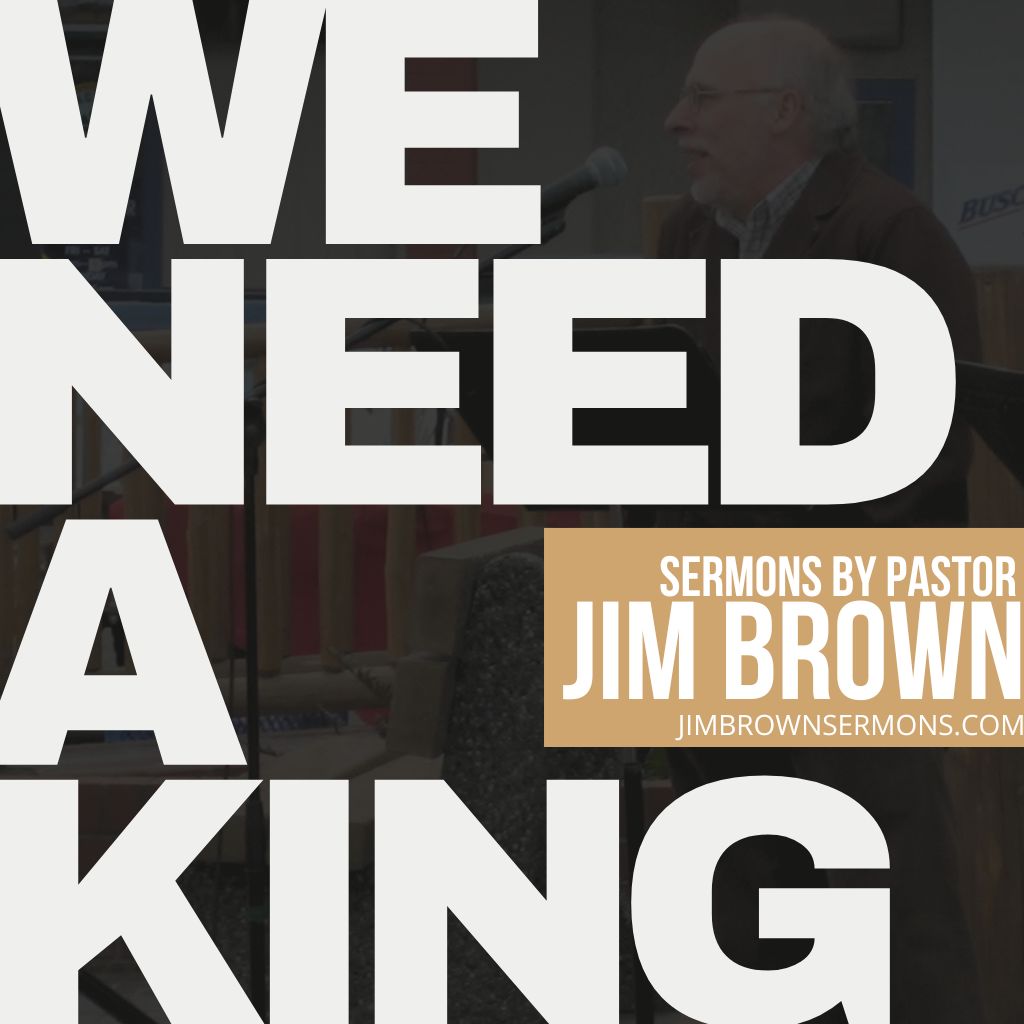
We Need A King | Finding True Security In God
1 & 2 Samuel
Life can feel a lot like driving through thick fog — unsettling, unclear, and unpredictable. You’re trying to make sense of the road ahead, but no matter how hard you try, you just can’t see far enough to feel secure. It’s frustrating and sometimes even frightening. That feeling of uncertainty isn’t just about driving — it’s how life feels when you’re unsure where to place your trust.
We all want to feel secure — to know that we’re safe, that things will work out, that we have something stable to rely on. But no matter how hard we try to create security through relationships, careers, or financial stability, it’s never enough. The truth is, true security comes from trusting God — not in controlling our circumstances or figuring everything out ourselves.
This need for security isn’t new. It’s a theme that runs throughout Scripture, from the early days of Israel to the rise and fall of kings. The Israelites sought security in a human king, even after God had shown them He was more than enough. In this message, we’ll explore how the stories of Saul and David reveal the difference between seeking security in human strength and finding true security in God.
The Human Need for Security
It’s a well-established fact that mankind has a deep need for security. We try to meet that need in countless ways — through relationships, success, money, and control. But no matter how hard we try, the void remains. It’s like chasing the horizon — the closer you think you are to it, the further away it gets.
We’ve all felt it — that moment when life spins out of control. Maybe you’ve had your house broken into and felt that violation of trust. Or you’ve experienced tension in a relationship with a spouse, a child, or a parent — that feeling that things are falling apart and you can’t fix it.
When life feels uncertain, we naturally try to create our own sense of security. But the reality is, nothing in this world can give us the deep, lasting security we crave — except God.
Hebrews 13:8 (NIV) says, “Jesus Christ is the same yesterday and today and forever.”
That’s where true security lies — in the unchanging nature of God. If God never changes, then His promises never change. His faithfulness never changes. His love never changes. That’s a foundation you can build your life on.
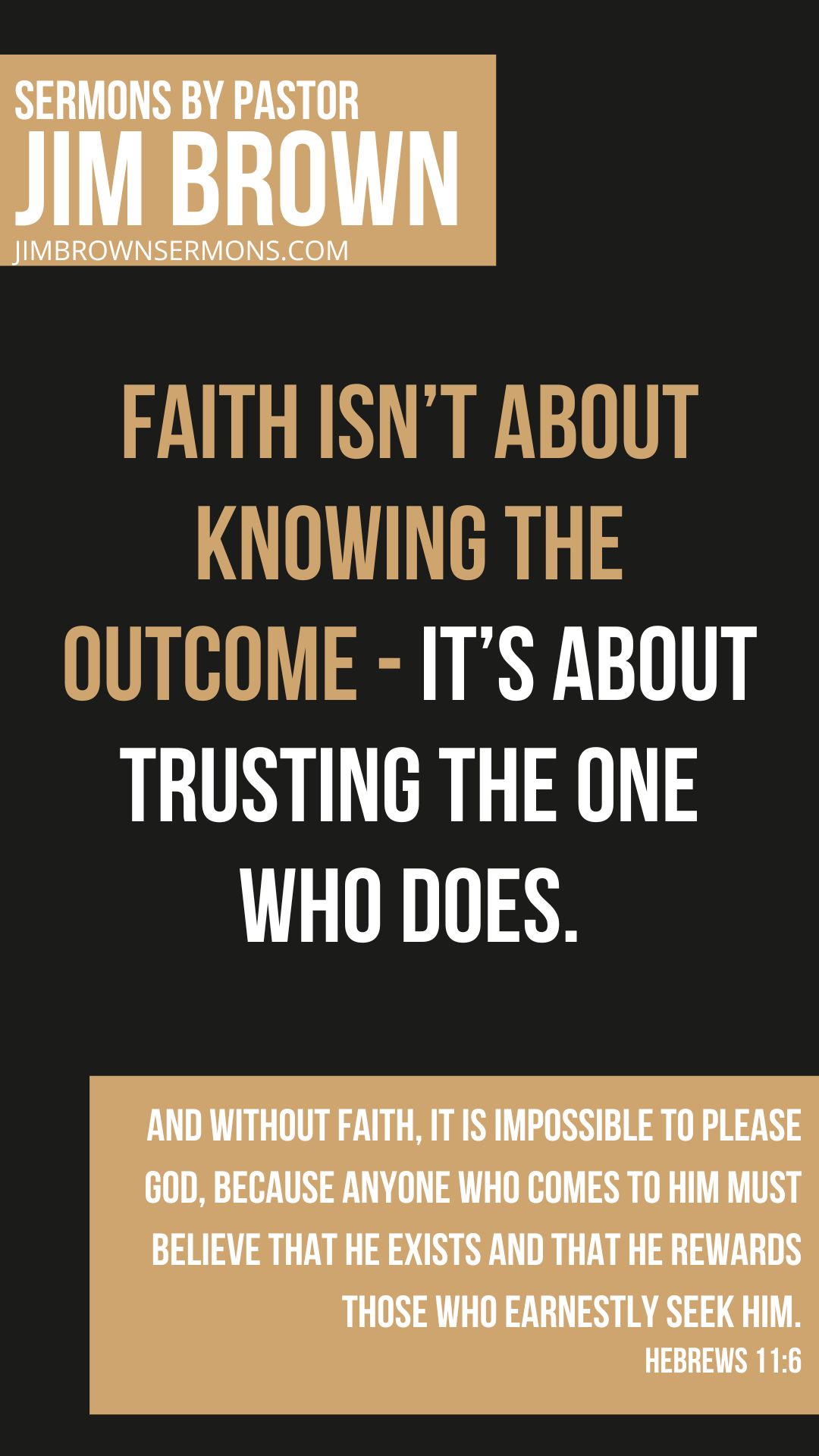
Faith Is the Foundation of Security
The Bible makes it clear that faith is the foundation of a secure relationship with God. Faith isn’t just agreeing with God’s existence — it’s actively relying on Him.
Hebrews 11:1 (NLT) says, “Faith shows the reality of what we hope for; it is the evidence of things we cannot see.”
Faith means trusting God even when you can’t see the outcome. It’s knowing that God is in control even when life feels chaotic. But that kind of faith doesn’t happen automatically — it’s built through a relationship with God.
The stories in Hebrews 11 — from Noah to Abraham to Moses — all point to the power of faith. These people didn’t have all the answers, but they trusted God anyway.
“And without faith, it is impossible to please God, because anyone who comes to him must believe that he exists and that he rewards those who earnestly seek him.” – Hebrews 11:6 (NIV)
Seeking God means surrendering control. It means believing that even when you can’t see the whole picture, God is working behind the scenes for your good.
Israel’s Misplaced Desire for a King
Despite God’s faithfulness, the Israelites wanted a king — someone they could see, someone they could follow. They weren’t content with trusting in the invisible hand of God. They wanted visible security.
Samuel was the prophet who led Israel during this time. He had been faithful to God since he was a child. When Samuel first heard God’s voice calling him, his response was simple:
“Speak, for your servant is listening.” – 1 Samuel 3:10 (NIV)
Samuel trusted God completely. But the people didn’t. They demanded a king, thinking that human leadership would give them the security they craved. God granted their request — but it came with consequences.
Saul’s Downfall Through Disobedience
Saul was the first king of Israel — and on the surface, he looked like the perfect leader. He was strong, successful, and respected. But Saul’s downfall came because he relied on himself instead of trusting God.
Before a key battle, Samuel instructed Saul to wait before offering a sacrifice. But Saul got impatient. He went ahead and made the offering himself — stepping outside of God’s command.
Saul’s disobedience cost him everything. He sought security through control instead of trusting God’s timing.
David, on the other hand, also faced challenges — but his response was different. David’s security came not from his position or success, but from his trust in God.
David’s Response: Finding Security in God
David’s life wasn’t easy. He faced betrayal, failure, and even danger from Saul himself. But David knew where his security lay — not in his kingship or his strength, but in God.
“In peace I will lie down and sleep, for you alone, O Lord, will keep me safe.” – Psalm 4:8 (NLT)
David’s ability to rest in the middle of chaos came from knowing that God was in control.
But David wasn’t perfect. His affair with Bathsheba and the subsequent fallout showed his humanity. The difference was in his response. When confronted with his sin, David didn’t justify or excuse it — he confessed it.
“Create in me a clean heart, O God. Renew a loyal spirit within me.” – Psalm 51:10 (NLT)
David’s willingness to bring his brokenness before God is what made him a man after God’s heart.
“The sacrifice you desire is a broken spirit. You will not reject a broken and repentant heart, O God.” – Psalm 51:17 (NLT)
True security doesn’t come from getting it right — it comes from being willing to lay your failures at God’s feet and trusting Him to restore you.
The Power of Confession and Repentance
Unconfessed sin creates distance between us and God. David understood that his security didn’t come from covering up his mistakes — it came from being honest before God.
“If I had cherished sin in my heart, the Lord would not have listened.” – Psalm 66:18 (NIV)
When we confess our sins, God restores us.
“Therefore confess your sins to each other and pray for each other so that you may be healed.” – James 5:16 (NIV)
Repentance brings healing — not just spiritually, but emotionally and relationally.
Surrendering the Throne
We already have a King — Jesus Christ. But to experience His peace and security, we have to let go of control and allow Him to lead.
“Come to me, all you who are weary and burdened, and I will give you rest.” – Matthew 11:28 (NIV)
God’s rest comes when we stop striving and start trusting.
“Do not be deceived: God cannot be mocked. A man reaps what he sows.” – Galatians 6:7 (NIV)
True security is not in power, control, or success — it’s in trusting the One who holds all things together.
Living by Faith and Trusting God’s Plan
David and Saul both sinned — but David’s legacy was defined by his faith and repentance. He didn’t rely on his strength — he relied on God’s mercy.
Are you looking for security in people, success, or control? Or are you willing to trust that God is enough?
True security comes not from figuring it all out — but from trusting the One who already has.
God is enough. He always has been, and He always will be.

Original Sermon Date: November 20, 2005
Thank you for visiting! Some of the links in this post are affiliate links, and we may earn a small commission at no additional cost to you. The income generated helps cover website maintenance costs, allowing us to continue sharing sermons, resources, and content with you. We appreciate your support!
© 2025 Sermons by Pastor Jim Brown www.jimbrownsermons.com All rights reserved.
More Resources and Sermons
If you’re looking to dive deeper into Christian podcasts, faith and prayer, and sermons on faith, check out our other resources on the website. Learn more about how to grow in faith, trusting God in hard times, and Christian sermons online to strengthen your walk with God.
CHECK OUT LAST WEEK’S SERMON
What Are You Doin’?! | Trusting God’s Plan Changes Everything
If you’re looking to dive deeper into Christian podcasts, faith and prayer, and sermons on faith, check out our other resources on the website. Learn more about how to grow in faith, trusting God in hard times, and Christian sermons online to strengthen your walk with God.
RECENT SERMONS
Ep 21: HEARTS OF STONE | Dependence on God Unlocks Transformation
When faith over feelings fails, dependence on God unlocks true transformation. Grow stronger in faith and prayer through this powerful Christian podcast.
DEV 1: WHEN YOU’RE TIRED OF HOLDING IT ALL TOGETHER | Trust In God
Feeling overwhelmed? Learn how to trust in God, surrender control, and find peace through this encouraging devotional based on Haggai 1:5.
Ep 20: Back TO BASICS | The Life-Changing Call to Surrender to God
When life feels off track, it’s time to surrender to God. This powerful message reveals how faith, identity, and revival begin with full surrender.
Ep 19: IT’S ALL DOWNHILL FROM HERE | Submit to God for Real Freedom
Ep 18: THINKING BACK LOOKING AHEAD | God’s Love Never Fails
Find hope in the midst of uncertainty as this sermon reveals how God’s love, mercy, and faithfulness remain steady—even when life doesn’t go as planned.
EP 16: WHAT ARE YOU DOIN’?! | Trusting God’s Plan Changes Everything
When life feels uncertain, trusting God’s plan changes everything. See how His faithfulness, redemption, and promises lead to true victory in Christ.





